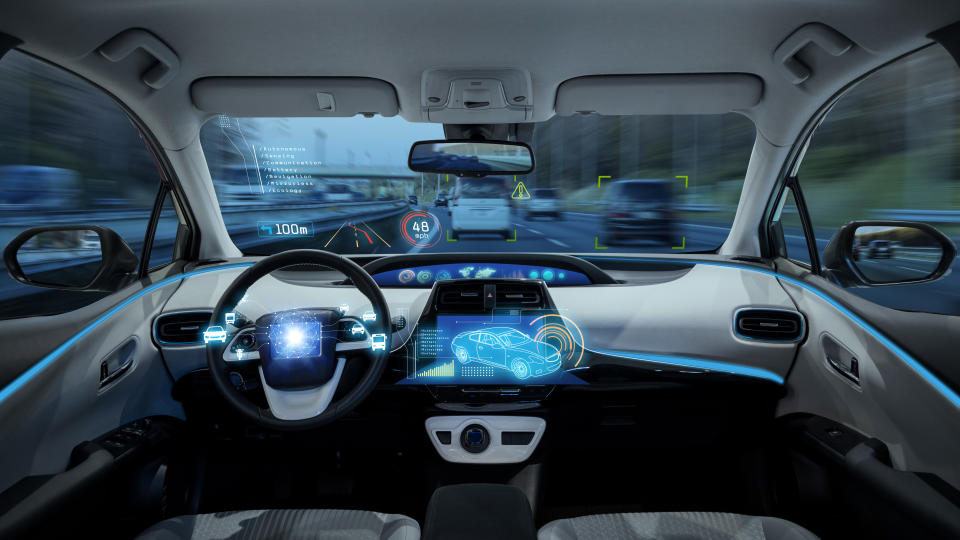3 Top Driverless Car Stocks to Watch
It's folly to think of driverless cars as some far-off future technology. They're already here. In Las Vegas, the self-driving car partnership between Lyft and Aptiv recently hit the 50,000-ride mark. Tesla's Elon Musk, in a boast about his company's driverless system, predicts his company could have 1 million "robotaxis" on the road next year.
We asked three Motley Fool contributors to weigh in on companies to watch as driverless technology emerges as the next big thing. Read on to see why Alphabet (NASDAQ: GOOG) (NASDAQ: GOOGL), NXP Semiconductors (NASDAQ: NXPI), and Walmart (NYSE: WMT) -- yes, that Walmart -- made their lists.

An undisputed leader
Chris Neiger (Alphabet): A lot of automakers and technology companies are diving headfirst into driverless cars, but none can compare to the head start that Alphabet's self-driving vehicle company, Waymo, has established.
Waymo, which was once known as Google's self-driving car project, has already logged more than 10 million self-driving miles on public roads. At the end of 2018, the company launched one of the first autonomous ridesharing services in the U.S., called Waymo One. The service allows users to hail an autonomous ride (with a human driver still behind the wheel monitoring the vehicle) to get around town in the Phoenix area.
Why does all of this matter? Because Waymo's years of research and testing give the company a nearly unparalleled lead in the autonomous vehicle space. Sure, other companies are making strides in the self-driving space, but Waymo's lead could allow the company to license its technology to other companies looking to catch up quickly.
The driverless car market is expected to be worth $7 trillion by 2050, and with Waymo's early moves, Alphabet is perfectly poised to benefit as it grows. The additional benefit for investors is that Alphabet won't sink or swim based on the driverless car market, which gives investors a great way to add exposure to their portfolios without much risk.
Don't forget about this spurned market leader
Anders Bylund (NXP Semiconductors): This Dutch chipmaker has often been lost in the automotive computing conversation after the failed merger with industry giant Qualcomm (NASDAQ: QCOM). But NXP is still the leading chip provider in this market, sporting annual sales of $4.5 billion and growing market shares in important categories such as digital instrumentation clusters and driver assistance systems (ADAS).
The global market for semiconductors in cars is expected to reach $67.5 billion per year in 2023. If NXP can hold on to a 12.5% share of that annual revenue pie, that works out to an 87% increase in sales for this crucial division over the next four years. I see no reason to believe that NXP would let its market share slip, given the company's rising importance in some of the most interesting sub-markets.
So NXP is staring down a huge market opportunity here, fully explaining why Qualcomm was willing to pay $44 billion for the company. NXP's stock trades at just 10.7 times forward earnings or 9.6 times trailing free cash flows, giving further support to the thesis that the shares are undervalued.
Simply returning to the formerly promised $44 billion market cap would give shareholders a 37% return from current prices, and that's nothing more than a reasonable interim goal. There should be plenty of value left to unlock even beyond that level as the auto industry moves deeper into self-driving features and meaty sensor packages.

Increased automation benefits Walmart
Jamal Carnette, CFA (Walmart): At first glance, it may seem nonsensical to include Walmart as a company slated to benefit from autonomous vehicles instead of an automaker or a chip manufacturer. However, to not include Walmart as a winner in the shift to driverless vehicles is missing the forest for the trees: Autonomous vehicles will eventually eliminate the need for human drivers. Outside of shipping companies directly, can you envision a company better poised to benefit from lower transportation and delivery costs?
After years of ceding e-commerce, current CEO Doug McMillon was no longer content to lose this critical channel and paid approximately $3.3 billion for Amazon's biggest rival, Jet.com, in a cash-and-stock transaction in 2016. Autonomous vehicles could be the final link to becoming a true competitor with Amazon, lowering costs not only for distribution-center delivery but also for the critical last-mile component. This is the hidden piece that will allow Walmart's nearly 4,800 stores to become single-day (or faster) delivery outposts, putting tremendous pressure on Amazon.
Walmart understands this and has been steadily partnering with autonomous vehicle companies, with an eye on grocery delivery, presumably because its numerous store locations give it a natural advantage over Amazon in perishable delivery. As fellow Fool Leo Sun notes, the company partnered with Alphabet's Waymo to bring customers to grocery stores and entered into a pilot with Ford's driverless cars in Miami to deliver groceries. Walmart is in the driver's seat to benefit from a world in which nobody is in a driver's seat.
More From The Motley Fool
Suzanne Frey, an executive at Alphabet, is a member of The Motley Fool's board of directors. Anders Bylund owns shares of Alphabet (A shares), NXP Semiconductors, and Tesla. Chris Neiger has no position in any of the stocks mentioned. Jamal Carnette, CFA owns shares of Alphabet (C shares). The Motley Fool owns shares of and recommends Alphabet (A shares), Alphabet (C shares), and Tesla. The Motley Fool owns shares of Qualcomm. The Motley Fool recommends NXP Semiconductors. The Motley Fool has a disclosure policy.
